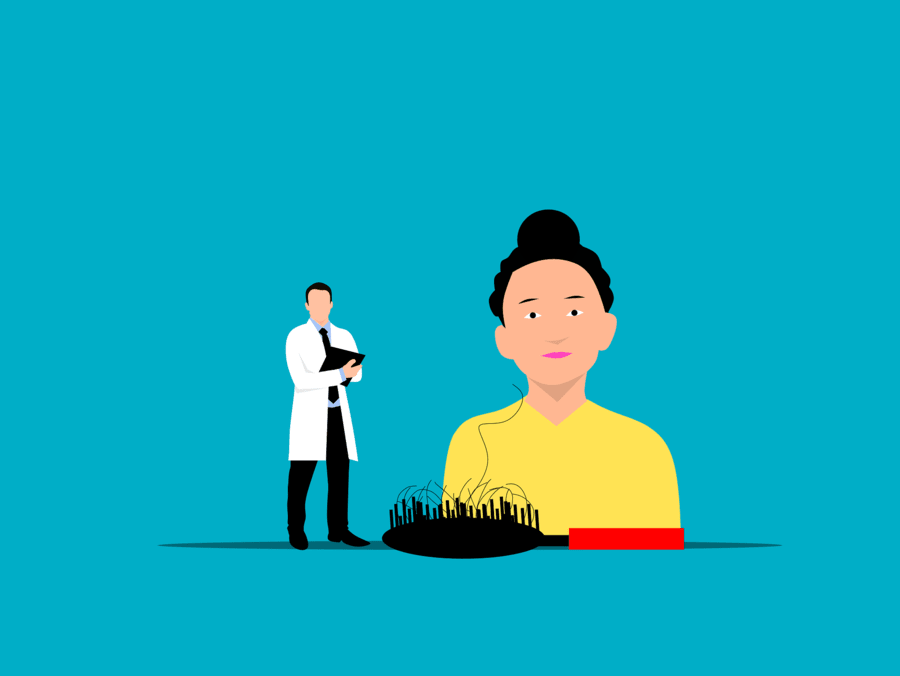Introduction:
When dealing with stress, whether it’s emotional stress from a breakup, job loss, or the loss of a loved one, it’s not uncommon to experience stress-related hair loss. The pressure of school or work, financial insecurity, or major external factors like a disaster or pandemic can all contribute to this type of hair loss. Even significant life events such as divorce, major illness, surgery, accidents, or childbirth can be overwhelming, causing more of your hair follicles to enter the resting phase and eventually move into the shedding phase. It’s essential to understand how this process works and what can be done to encourage your hair follicles to return to the growth phase.

The key to regaining hair after stress-related hair loss lies in reducing the stressor and helping your body recover. Scientists have found that hormones like cortisol and adrenaline, which are released during a fight-or-flight reaction, can affect the hair follicle’s ability to function. These hormones reduce blood flow to the skin, rerouting nutrients to more vital organs, which may leave your scalp lacking the essential nutrients it needs to support healthy hair growth. To counter this, it’s crucial to focus on stress management techniques that promote relaxation and restore balance. Prioritizing self-care, maintaining a balanced diet rich in vitamins, and using gentle hair care practices can gradually coax your hair follicles back into the growth phase, allowing them to regain strength and vitality.
Additional Forms of Stress-Induced Hair Loss
There are two other causes of stress and hair loss, though they are less common:
- Trichotillomania:
Trichotillomania, often referred to as a hair-pulling disorder, is a challenging disorder where individuals find themselves pulling out their own hair. This behavior can be intensified by high stress levels, as stress tends to worsen the urge. Managing this disorder typically involves various treatment approaches, with therapy being one of the most effective options to help those affected regain control over their actions and reduce the compulsion to pull out their hair. - Alopecia Areata:
Alopecia areata is a unique form of hair loss where the body’s immune system mistakenly attacks the hair follicles, leading to noticeable hair loss. Unlike telogen effluvium, which causes diffuse shedding across the scalp, alopecia areata often presents as round bald spots. This condition is more difficult to treat because it is an autoimmune disorder, and stress is believed to contribute to its development and progression. Managing alopecia areata can be challenging, but understanding its triggers is the first step toward addressing this persistent issue.
What Are the Signs of Hair Loss Due to Stress?
Stress-related hair loss often presents itself in a few noticeable ways. One common type, known as telogen effluvium, is characterized by abrupt, diffuse, and temporary hair loss. This condition usually leads to sudden shedding of hair about two or three months after experiencing a stressful event. Unlike other conditions like alopecia areata or trichotillomania, where hair loss occurs in concentrated areas, telogen effluvium causes hair to be lost all over the scalp. You might observe a wider hair part or even a smaller ponytail as the hair thins out. Fortunately, this form of stress-related hair loss is usually temporary. Once the stressor is removed, the hair typically begins to regrow.
However, the hair regrowth process can be slow, sometimes taking up to a year for the hair to fully return to its regular density. While the wait may be frustrating, there are tips you can follow to help regain hair loss from stress and encourage quicker hair regrowth. With the right care and patience, you can restore your hair and regain your confidence.
How to Regain Hair Loss from Stress: 8 Effective Methods:
1. Nourish Your Body with a Balanced Diet:
To support your body and hair, it’s essential to follow a healthy diet rich in fruits, vegetables, whole grains, healthy fats, and lean proteins. This balanced approach can help with stress-related hair loss. Since hair is made from protein, including plenty of protein sources in your diet is crucial. Think about adding poultry like chicken and turkey, as well as quinoa, eggs, fish, and soy products like tofu to help regain hair loss from stress. A focus on protein will give your hair the strength it needs to grow back healthier.
2. Take a Supplement:
To regain hair loss caused by stress, it’s important to maintain a healthy diet rich in nutrient-dense foods. However, sometimes your body needs an extra boost, which is where supplements come in. Certain vitamins like vitamins A, B6, B12, and C play a crucial role in supporting a normal functioning immune system, which is essential for your overall health and hair recovery. Adding these supplements to your routine can help fill any nutritional gaps and support your body’s natural ability to heal and grow healthy hair.
3. Topical Treatments for Hair Regrowth:
Using topical treatments like minoxidil and natural oils can be an effective way to stimulate and regain hair loss. Minoxidil, a well-known hair loss treatment, works by providing essential nutrients to the hair follicles, helping to promote new hair growth and slow down hair shedding when applied to the entire scalp. On the other hand, natural oils such as coconut oil, castor oil, and rosemary oil are excellent for improving scalp health. These oils can be massaged into the scalp to promote hair growth by increasing blood flow and delivering essential nutrients directly to the hair follicles. By incorporating both minoxidil and natural oils into your routine, you can effectively support the hair growth cycle and enhance overall scalp health.
4. Scalp Care and Massage:
Taking care of your scalp through regular scalp care and massage can do wonders for your hair. By massaging the scalp, you can increase blood flow and promote relaxation, which in turn helps support the regrowth of hair. This process stimulates blood circulation to the hair follicles, delivering the essential nutrients and vitamins needed to regain hair loss from stress. However, be cautious during telogen effluvium, as using a scalp massager might be counterproductive and could lead to further hair loss. To enhance the benefits of your scalp massage, consider using products like Scalp Delight TM Detox Scrub to exfoliate and nourish your scalp for optimal results. A deep and thorough massage not only stimulates circulation but also plays a vital role in your hair care routine to support hair and manage stress effectively.
5. Developing Healthy Hair Habits:
Creating healthy hair habits is crucial for preventing hair loss and supporting regrowth. Start by using gentle hair products like sulfate-free shampoos and natural oils to protect hair from damage and promote hair health. It’s also important to avoid heat styling tools that can harm your hair. Instead, opt for air-drying and using heat protectant products to prevent breakage and further damage. These small changes can make a big difference in keeping your hair strong and resilient.
6. Quite Smoking:
Another essential habit is quitting smoking, as it plays a significant role in maintaining healthy hair and promoting hair regrowth. By avoiding secondhand smoke and steering clear of triggers, you can protect your hair and overall health. Seeking support from friends, family, or professionals can help you quit smoking and improve hair health. By incorporating healthy hair habits into your everyday life, you can protect hair from the damaging effects of stress and support regrowth, leading to stronger and healthier hair.
7. Get Enough Sleep:
When dealing with stress, it’s crucial to maintain regular sleep patterns to avoid making the situation worse. Aim for seven to nine hours of sleep per night, as this helps your body recover and function at its best. If you find yourself struggling to rest properly, consider focusing on sleep hygiene by creating a consistent routine. Go to bed and wake up at the same time each day, even on weekends. Incorporating an evening routine can help you wind down effectively before going to bed. Techniques like stress management techniques can be a helpful addition to your nighttime ritual. Ensure your bedroom is a cool, dark room and try to avoid screens at least an hour before bed. With these small adjustments, you’ll find that quality sleep becomes more attainable, even in the face of stress.
8. Manage Stress:
Stress can often lead to unwanted effects on our bodies, including hair loss. To regain your health and well-being, it’s essential to focus on stress management techniques that help mitigate the damage. The regrowth of hair, for example, is only possible once the stress has been removed. Different strategies, like yoga, meditation, and deep breathing exercises, are highly effective in managing stress.
If you’re new to yoga, consider joining a class or following a YouTube video that introduces various types of yoga. It’s an excellent stress-relieving tool that not only helps your body but also calms your mind. Meditation is another low-cost method to reduce stress. Simply sit in a comfortable position, close your eyes, and focus on your breath. When your thoughts wander, gently guide them back to your breathing. Start with 5 minutes daily and gradually increase to longer sessions. If you struggle with traditional meditation, try a guided meditation; many free guided meditations are available online.
Incorporating deep breathing exercises like box breathing, alternate nostril breathing, or the 4-7-8 breathing technique can lower stress levels and improve focus. These methods are simple yet powerful tools that can be practiced anywhere. Another effective approach is journaling, which helps quiet a racing mind by putting your thoughts on traditional paper or typing them on a computer.
Additionally, spending time outdoors in nature is a wonderful way to achieve effective stress reduction. The fresh air and natural surroundings can do wonders for your mood, especially if you also engage in exercise or meditate outdoors. For those dealing with more severe stress, counseling or therapy with a licensed therapist or mental health counselor can be invaluable. They can help you heal from traumas and teach you more specialized techniques to manage stress-related hair loss.
Remember, everyone is different, and finding the right techniques that work best for you may require some experimentation. By integrating these practices into your life, you can regain control over stress and its effects on your health.
Conclusion:
To regain hair loss from stress, it is crucial to first address and manage the underlying stress. The regrowth of hair can only occur when stress is effectively removed. Implementing stress management techniques such as yoga, meditation, and deep breathing exercises can help to reduce stress levels, which in turn supports hair regrowth. Engaging in activities like journaling and spending time outdoors in nature also contributes to lowering stress, creating a more conducive environment for hair to grow back. If stress is severe, seeking counseling or therapy from a licensed therapist or mental health counselor can be instrumental in addressing the root causes of stress, promoting both emotional healing and the potential for hair regrowth. Remember, consistent and patient application of these techniques is key, as everyone is different and what works best will vary from person to person.
